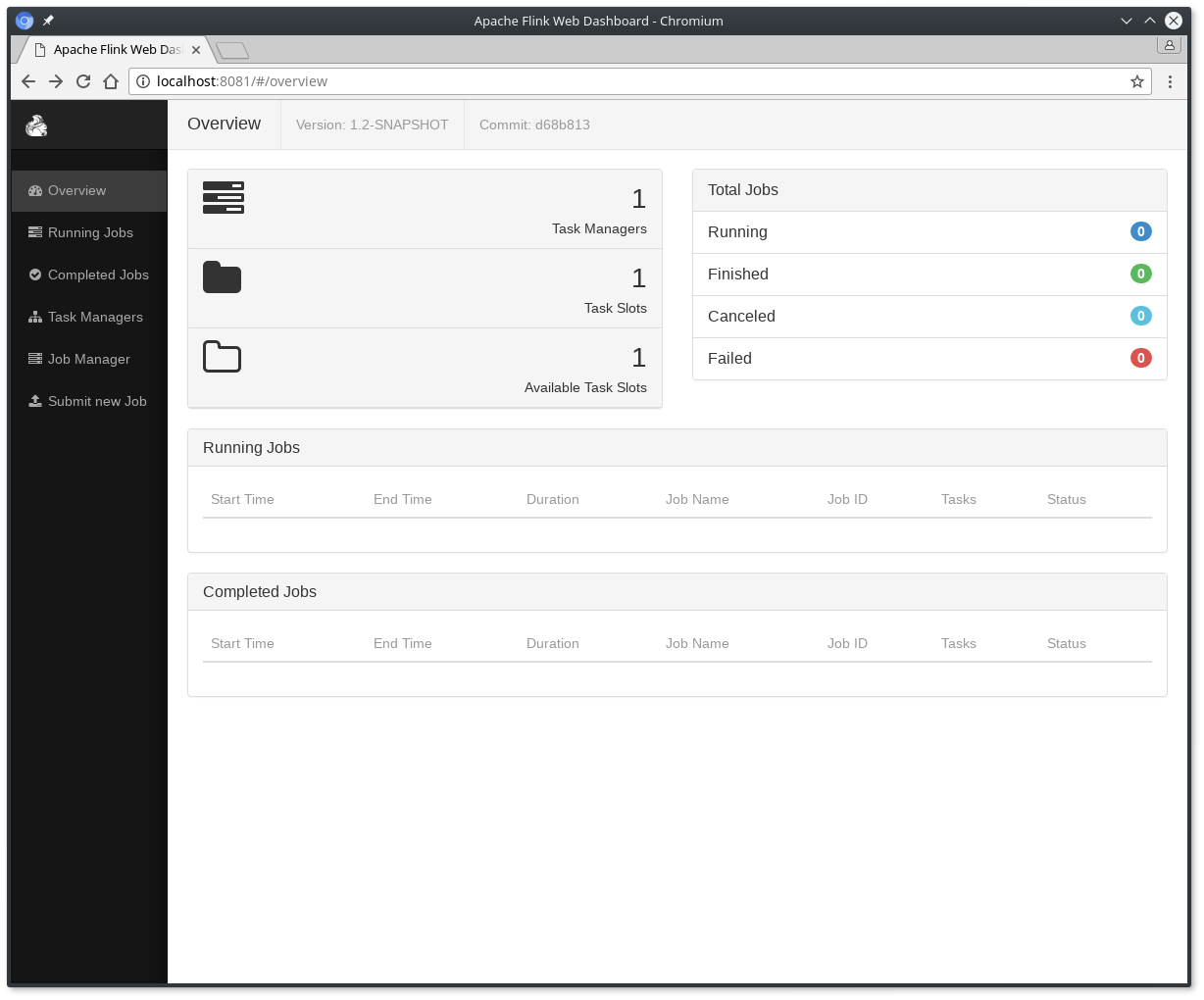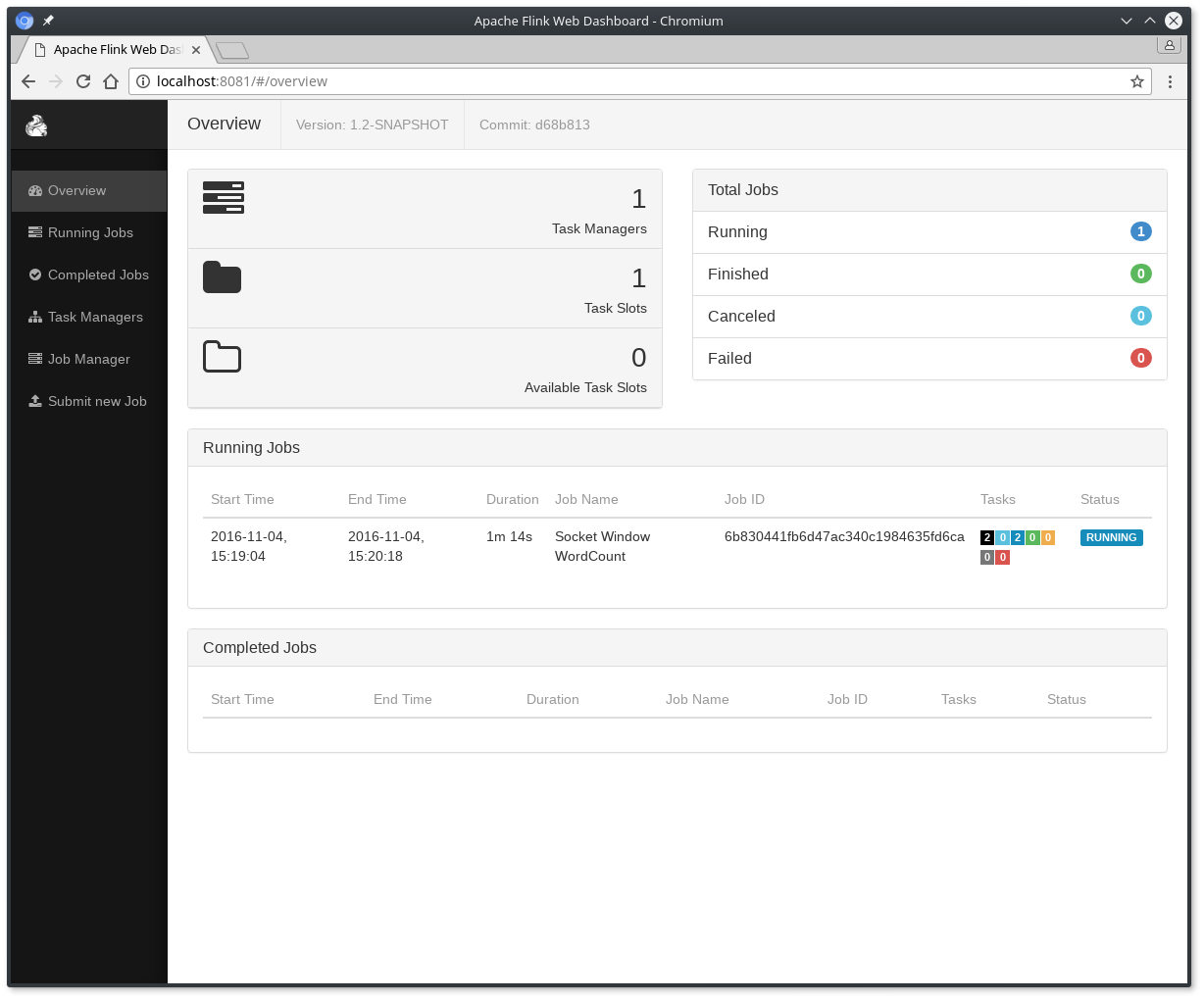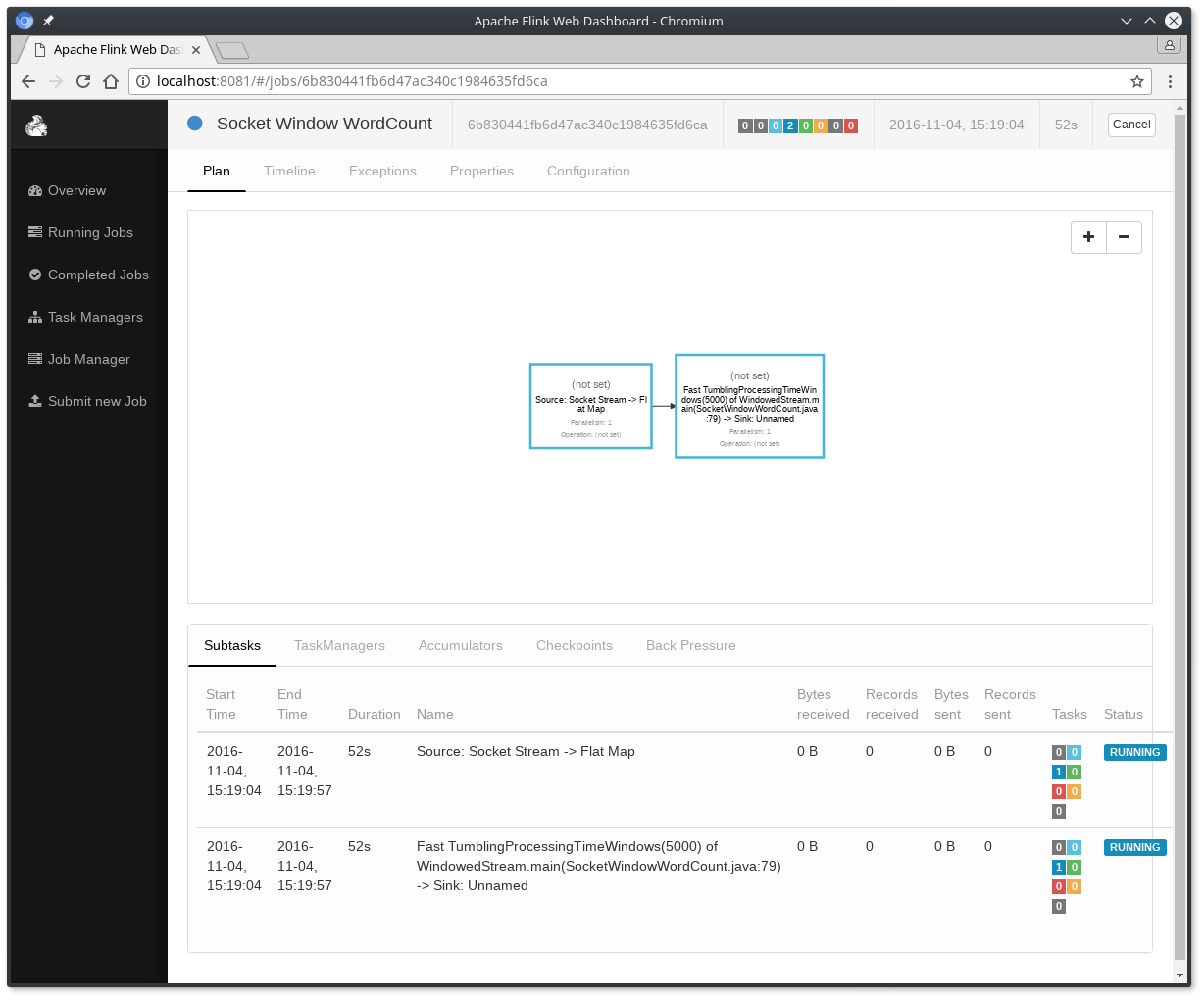本地安装教程
只需几个简单的步骤即可启动并运行Flink示例程序。
设置:下载并启动Flink
Flink可在Linux,Mac OS X和Windows上运行。为了能够运行Flink,唯一的要求是安装一个有效的Java 8.x. Windows用户,请查看Windows上的Flink指南,该指南介绍了如何在Windows上运行Flink以进行本地设置。
您可以通过发出以下命令来检查Java正确安装:
java -version
如果你有Java 8,输出将如下所示:
java version "1.8.0_111"
Java(TM) SE Runtime Environment (build 1.8.0_111-b14)
Java HotSpot(TM) 64-Bit Server VM (build 25.111-b14, mixed mode)
下载并编译
从我们的某个存储库克隆源代码,例如:
$ git clone https://github.com/apache/flink.git
$ cd flink
$ mvn clean package -DskipTests # this will take up to 10 minutes
$ cd build-target # this is where Flink is installed to
启动本地Flink群集
$ ./bin/start-cluster.sh # Start Flink
检查分派器的web前端在HTTP://localhost:8081,并确保一切都正常运行。Web前端应报告单个可用的TaskManager实例。
您还可以通过检查logs目录中的日志文件来验证系统是否正在运行:
$ tail log/flink-*-standalonesession-*.log
INFO ... - Rest endpoint listening at localhost:8081
INFO ... - http://localhost:8081 was granted leadership ...
INFO ... - Web frontend listening at http://localhost:8081.
INFO ... - Starting RPC endpoint for StandaloneResourceManager at akka://flink/user/resourcemanager .
INFO ... - Starting RPC endpoint for StandaloneDispatcher at akka://flink/user/dispatcher .
INFO ... - ResourceManager akka.tcp://[[email protected]](/cdn-cgi/l/email-protection):6123/user/resourcemanager was granted leadership ...
INFO ... - Starting the SlotManager.
INFO ... - Dispatcher akka.tcp://[[email protected]](/cdn-cgi/l/email-protection):6123/user/dispatcher was granted leadership ...
INFO ... - Recovering all persisted jobs.
INFO ... - Registering TaskManager ... under ... at the SlotManager.
阅读代码
您可以在Scala和Java上的GitHub上找到此SocketWindowWordCount示例的完整源代码。
object SocketWindowWordCount {
def main(args: Array[String]) : Unit = {
// the port to connect to
val port: Int = try {
ParameterTool.fromArgs(args).getInt("port")
} catch {
case e: Exception => {
System.err.println("No port specified. Please run 'SocketWindowWordCount --port <port>'")
return
}
}
// get the execution environment
val env: StreamExecutionEnvironment = StreamExecutionEnvironment.getExecutionEnvironment
// get input data by connecting to the socket
val text = env.socketTextStream("localhost", port, '\n')
// parse the data, group it, window it, and aggregate the counts
val windowCounts = text
.flatMap { w => w.split("\\s") }
.map { w => WordWithCount(w, 1) }
.keyBy("word")
.timeWindow(Time.seconds(5), Time.seconds(1))
.sum("count")
// print the results with a single thread, rather than in parallel
windowCounts.print().setParallelism(1)
env.execute("Socket Window WordCount")
}
// Data type for words with count
case class WordWithCount(word: String, count: Long)
}
public class SocketWindowWordCount {
public static void main(String[] args) throws Exception {
// the port to connect to
final int port;
try {
final ParameterTool params = ParameterTool.fromArgs(args);
port = params.getInt("port");
} catch (Exception e) {
System.err.println("No port specified. Please run 'SocketWindowWordCount --port <port>'");
return;
}
// get the execution environment
final StreamExecutionEnvironment env = StreamExecutionEnvironment.getExecutionEnvironment();
// get input data by connecting to the socket
DataStream<String> text = env.socketTextStream("localhost", port, "\n");
// parse the data, group it, window it, and aggregate the counts
DataStream<WordWithCount> windowCounts = text
.flatMap(new FlatMapFunction<String, WordWithCount>() {
@Override
public void flatMap(String value, Collector<WordWithCount> out) {
for (String word : value.split("\\s")) {
out.collect(new WordWithCount(word, 1L));
}
}
})
.keyBy("word")
.timeWindow(Time.seconds(5), Time.seconds(1))
.reduce(new ReduceFunction<WordWithCount>() {
@Override
public WordWithCount reduce(WordWithCount a, WordWithCount b) {
return new WordWithCount(a.word, a.count + b.count);
}
});
// print the results with a single thread, rather than in parallel
windowCounts.print().setParallelism(1);
env.execute("Socket Window WordCount");
}
// Data type for words with count
public static class WordWithCount {
public String word;
public long count;
public WordWithCount() {}
public WordWithCount(String word, long count) {
this.word = word;
this.count = count;
}
@Override
public String toString() {
return word + " : " + count;
}
}
}
运行示例
现在,我们将运行此Flink应用程序。它将从套接字读取文本,并且每5秒打印一次前5秒内每个不同单词的出现次数,即处理时间的翻滚窗口,只要文字漂浮在其中。
- 首先,我们使用netcat来启动本地服务器
$ nc -l 9000
- 提交Flink计划:
$ ./bin/flink run examples/streaming/SocketWindowWordCount.jar --port 9000
Starting execution of program
程序连接到套接字并等待输入。您可以检查Web界面以验证作业是否按预期运行:
- 单词在5秒的时间窗口(处理时间,翻滚窗口)中计算并打印到
stdout。监视TaskManager的输出文件并写入一些文本nc(输入在点击后逐行发送到Flink <return>):</return>
$ nc -l 9000
lorem ipsum
ipsum ipsum ipsum
bye
该.out文件将在每个时间窗口结束时,只要打印算作字浮在,例如:
$ tail -f log/flink-*-taskexecutor-*.out
lorem : 1
bye : 1
ipsum : 4
要停止Flink当你做类型:
$ ./bin/stop-cluster.sh


